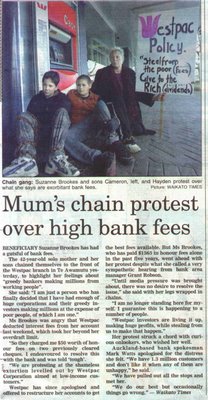
(left click to enlarge image)
Many people, including me, will be sympathetic to this protest against rapacious banks. Their fees are particularly burdensome on low income clients. But there is a certain irony in this protest. Ms Brookes is a beneficiary protesting on behalf of working people. Perhaps the best option for her to avoid incurring more dishonour fees would be to get a job. If there aren't any in Te Awamutu then she should move. Otherwise she has nothing to look forward to but years ahead with the likes of WINZ and Westpac exerting more control over her life than she can.

6 comments:
I note that she has paid "$1365 in honour fees". An honour fee is levied when you go overdrawn without arrangement and the bank doesn't bounce the cheque - the alternative is bouncing the cheque and incurring a more expensive dishonour fee. The fees she is upset about can be avoided if she didn't spend more money than she earns!
If banks didn't charge fees for services this would be reflected in higher interest charges for lending and lower interest for depositors - remember that banks aren't charities.
Most banks move the costs of business from profitable customers to unprofitable customers to give them an advantage over competitors. The only bank that doesn't is the one that isn't making a return to it's shareholder - Kiwibank.
Thank you for the clarification Michael. I'd never heard of an "honour fee". Bank fees are relatively high to low income customers for the reasons you point out but I won't be changing to Kiwibank. You've made me think that a better alternative would be to close my account which always has a small balance and use my husbands, which is always profitable.
There are probably quite a lot of part-time workers in the same boat. I don't expect it to be an idea the banks promote however;-)
I don't think Michael is strictly correct re Honour Fees.
I consider `Honour Fees' represent usury of the highest order. It costs the bank absolutely nothing to meet a payment which takes an account into either overdraft or excess of an arranged limit. When this happens interest at `excess rates' usually kicks in so the bank is in effect `double dipping' by charging an Honour Fee.
It is a fact that banks have little or no conscience in taking maximium fees from their customers so this charge is more likely to increase than be removed. This may be one area where this socialist government could do some good by legislating against Honour Fees.
pdm: the fees are high yes but honouring the payments do affect the bank's ledgers and so they make it up either in fees or interest.
Going back a step - there's something a little wrong when she's paying that much in honour fees - either her banking consultant is inept or she can't budget. Both of those situations can be easily rectified to avoid fees like that.
pdm: I think I recognise your initials. do you recognise mine?
I don't agree with you mattie boy. With 18 years past banking experience - before honour fees but,with Dishonour Fees available but sparingly applied - there is little cost to banks in meeting cheques which take accounts outside of arrangements. I suspect the modern computer technology would reduce this further.
I consider honour fees to be blatant usury by banks to captive customers. Why penalty interest plus a fee??
mattie boy your name does not ring any bells.
You never have to pay an honour fee, or a dishonour fee, if you don't go overdrawn without arrangement. At $15 a time that's 91 times it has happened - I would have learnt after the first or second time it was charged. Most bankers will waive the fee (when asked) for 'first offenders'.
It's actually a fee that is less and less collected - when you talk to bankers they'll tell you that the income they earn from Honour Fees is diminishing as more people stick to their arrangements.
PDM - Banking is a lot more (self) regulated since the Basel Accords. (Don't worry - Most non-bankers haven't heard of those) In theory, a enough unarranged overdrafts could cause a bank to default to it's depositors (even temporarily) so discouraging them has become a major issue.
Post a Comment